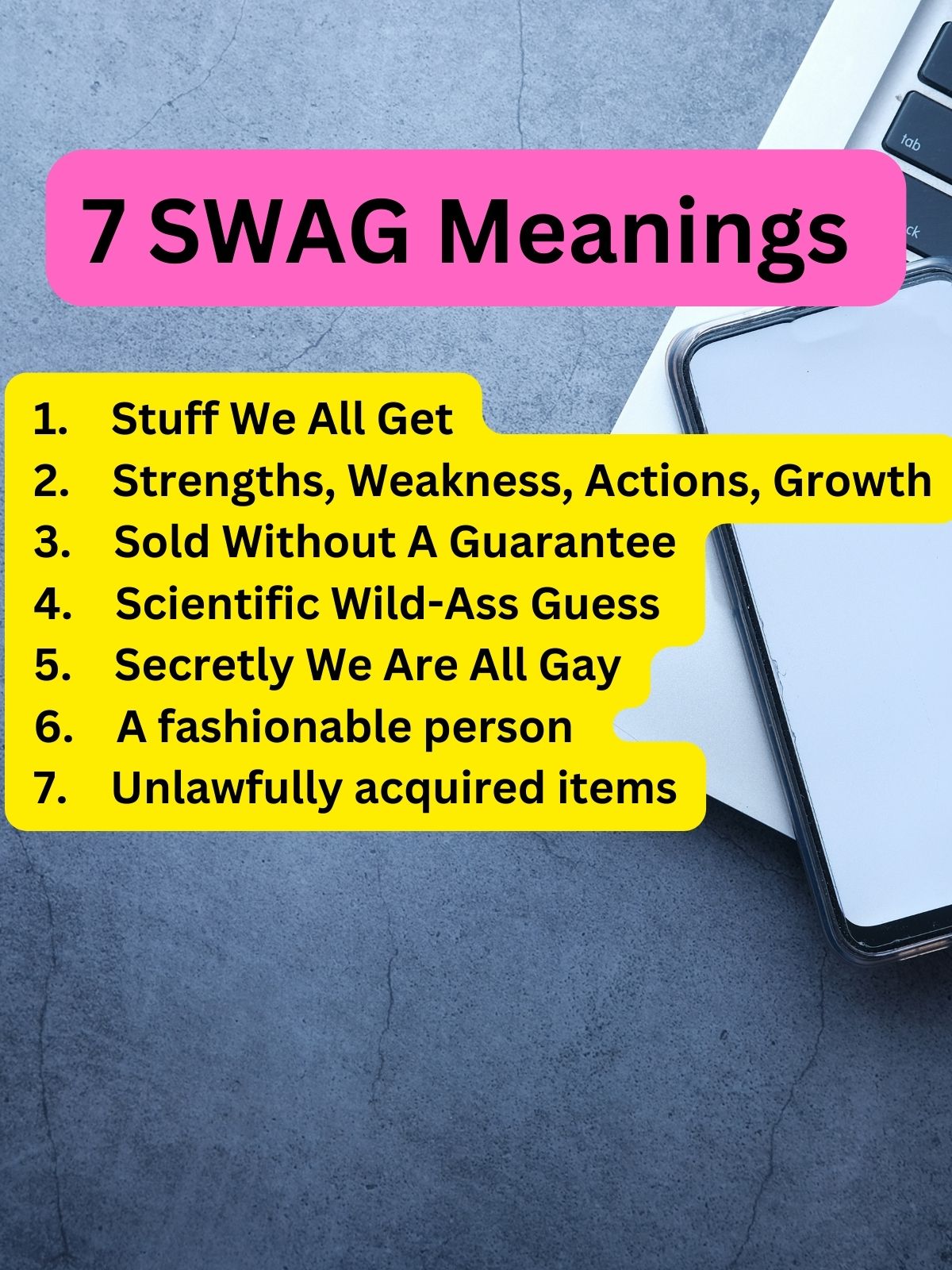What does "swag" truly signify in today's ever-evolving vernacular? "Swag" has undergone a remarkable transformation, traversing from its origins as a descriptor for stolen goods to its current multifaceted meaning, encompassing style, confidence, and even promotional items.
The journey of "swag" mirrors the dynamic nature of language itself. It began in the shadows, a term whispered among thieves to denote their illicit gains. Over time, it emerged into the sunlight, taking on a new identity as a symbol of swagger and self-assuredness, often seen at awards shows and sporting events. Now, it has broadened its horizons yet again, entering the corporate world to represent the brand's identity.
To understand the full scope of this evolution, let's delve into a comprehensive overview of the term:
- Elisabeth Shue From Karate Kid To Today Everything You Need To Know
- Ellen Pompeos Children Meet Stella Sienna Eli
| Term | Swag |
| Origin | Old Norse: "svagga" (to sway or swing) |
| Original Meaning | Stolen goods |
| Evolutionary Meanings |
|
| Modern Usage |
|
| Synonyms | Sauce, drip, water, fresh, fly |
| Contextual Examples |
|
| Negative Connotations | Potentially subjective; overuse can lead to irony or mockery. |
| Usage Across Demographics |
|
| Business Applications |
|
The word "swag" is a linguistic chameleon. Initially rooted in the Old Norse word "svagga," meaning "to sway or swing," it emerged as a term thieves used for stolen goods. This definition, though still present in some contexts, is far from its only interpretation.
As it entered the realm of street slang, "swag" began its transformation. It became associated with "swagger," reflecting an individual's self-assuredness and style. This shift was especially evident in the world of fashion and music, where "swag" denoted a confident and stylish appearance. The term expanded to encompass a sense of coolness and charisma, often used by teenagers and young adults to describe those who exuded confidence.
The internet, as always, played a role in solidifying "swag" as a part of the cultural lexicon. It evolved into an expression for stylish confidence and, with the rise of social media, the hashtag #swag became a frequent occurrence. It even made its way into songs, adding to its widespread adoption.
- Emily Osment Divorce Quick Unexpected Details Revealed
- Mr Bean Hilarious Adventures Legacy Of A Comedy Icon
It's not just about style; it's also about the free items handed out at events, the "stuff we all get," also known as promotional merchandise. Businesses and companies have leveraged this definition for marketing purposes. Company swag, which includes promotional items, welcome kits and branded merchandise distributed at events to increase brand awareness and foster lasting business relationships, is a strategy that aims to build customer loyalty. This is a strategic move to amplify brand awareness and forge enduring business connections.
Swag's meaning can change based on the context. If a girl has "swag", it typically means she has a stylish appearance and a confident attitude. When talking about business, the meaning shifts to promotional products to increase brand awareness. The word's versatility allows it to work in different settings. It's all about making an impression.
The etymology of swag reveals a long and varied history, originating from old Norse to street slang, encompassing various transformations.
This multifaceted nature explains why the term can be found in so many different contexts. You might hear it at a concert, where someone excitedly shares, "I went to a concert and bought some of the swag." Or maybe at a live TV show recording where audience members are given a "swag bag."
The word has been used as ghetto slang for swagger, and just like all ghetto slang, it caught on as a term used by preppy individuals. Even though it once just meant stolen loot, it has morphed into swagger and "swag" which means the way someone looks and dresses. These days, "fit" appears to be the preferred term.
It's likely that the sense of swag which means loot comes from a term thieves used to describe stolen goods. Now, you can hear it in a business context, where it means a tangible representation of a brand's ethos, distributed at events or trade shows. Welcome kits for new hires have become sophisticated onboarding tools that make lasting first impressions.
This evolution underscores the vitality of language, its ability to reflect and shape our cultural landscape. While "swag" began as a descriptor for stolen items, its meaning has broadened, and it now encompasses the multifaceted aspects of style, confidence, and even marketing tools.
The adaptability of "swag" makes it a unique term, and its versatility shows how language continues to mirror our ever-evolving world.
One must remember that the term "swag" can also be used in a playful or ironic manner. The word also has negative connotations. While "swag" generally has positive connotations, it can be subjective, and some individuals may interpret it differently.
It also shows up at awards shows and sporting events, not just the swag that refers to free promotional items given to attendees, but also the swag that refers to stylish confidence.
As we delve deeper into the world of "swag," it's clear that this term has transcended its humble beginnings to become a ubiquitous part of our communication. From its initial association with stolen goods to its modern-day connotations of confidence, style, and promotional merchandise, "swag" is a linguistic testament to the ever-shifting nature of language. It's a word that continues to surprise and evolve, reflecting the ever-changing cultural landscape.
So, when next you hear the word "swag," remember that it is a reflection of our own dynamic and ever-changing world.
- Kim Chiu Returns To Star Cinema Xian Lim Split More
- Matthew Ansara The Tragic Story Of Barbara Edens Son


